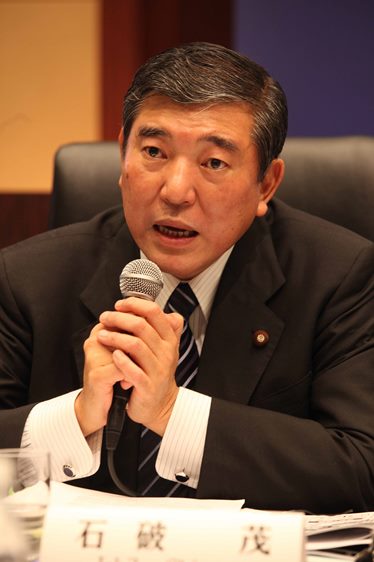
Shigeru Ishiba, chairman of the Policy Research Council of the main opposition Liberal Democratic Party (LDP), proposed that a sweeping realignment of political parties be the sole means to restore governance to Japanese politics.
He has a specific idea to this: First, enact special legislations to restore a multiple-seat constituency system in place of the present single-seat constituency system. Second, resolve the Lower House of the Diet for a general election under the multiple-seat constituency system once and for all, where all the Lower House members have to run for the National Diet as an independent with no party affiliation.
"At least some questions should be directed to all candidates. The first question is whether they support an increase in the consumption tax, and the second question is whether they approve of Japan's use of the right to collective self-defense," Ishiba said.
In the event of the general election, those who can win a seat should create a new political party with those who share the same opinion on the issues of great significance to the country, according to Ishiba. "This is my ideal about political realignment that should be achieved through the hands of the people, although I know I am dreaming," he smiled.
Ishiba, formerly a minister of defense and a minister of agriculture, forestry and fisheries, made these remarks during an interview by Yasushi Kudo, Representative of The Genron NPO. The interview was aired on Dec. 1 during a weekly FM radio program, titled 'ON THE WAY Journal.' Kudo regularly appears on the program to comment on various issues.
Ishiba has this to say about why the Japanese people voted for the main opposition Democratic Party of Japan (DPJ) in last year's general election, putting an end to many decades of LDP's reign and bringing about a change of government: "Regrettably, they chose the DPJ as the substitute to the LDP, which they thought was failing their expectations, and not because they thought the DPJ was good."
"Now, the people are beginning to think that they have made a wrong choice and that the DPJ is much worse than the LDP, tempting them to return power to the LDP," he said. He thus described the current state of Japanese politics as being a 'negative selection' or 'negative competition."
Asked why this happened, Ishiba said that many politicians have become overly-fixated on being elected, and for political parties to seize power. "Simply put, the purpose and the means are inverted. Becoming a politician and seizing power are just the means of materializing what they envision. The reality is that the ultimate goal for many politicians is to be elected, and for political parties, to seize power," he regretted.
Ishiba continued.
"My conviction is that national legislators should be much freer from the bonds of their political parties. However, in practice, they cannot leave their parties so easily. First, independents with no affiliation to organized political parties are not entitled to receive state subsidy for political parties. If a DPJ member loses party affiliation, he or she can no longer expect the support from labor organizations. The same holds for LDP members. No one wants to lose financial contributions and no one wants to lose an election."
If this is the case, is there no hope for changes in Japanese politics?
Ishiba is not completely pessimistic.
"The bottom line is whether we, politicians, have courage to speak the truth in public, at the risk of losing a Diet seat. Our ultimate goal is to change Japan, and we shouldn't care about losing a seat," he said.
Asked how many LDP Diet members are in the ranks of those who have the courage to do so, Ishiba's answer was "about 30 percent." He added that the same percentage would apply to their rival DPJ.
"This may be true for any society or organization. Only 30 percent are capable, 40 percent are common and the remaining 30 percent are useless. And if the capable 30 percent do the right thing, the common 40 percent would follow them," he said.
Now that Japan is in a national crisis in terms of foreign relations, national security and public finance, the National Diet members who share the same vision should come together, irrespective of party affiliation, and address the nation. We have no time to wait for a change of government, according to Ishiba.
Terming the latest change of government that gave birth to the DPJ government as "a great experiment that failed," Ishiba said the Japanese people now think it wrong to place "a man who has no thoughts about the country's diplomatic and national security policies" in the post of Japan's chief administrator, or prime minister.
Ishiba said it is not yet too late. "Japan's government bond prices are not yet plummeting, because people can still see a small ray of light (in the Japanese economy). The Japan-U.S. security treaty remains intact, as the United States still regards Japan as a useful partner. It is not yet too late for us to fix things."
- All excerpts of comments are translations from Japanese to English